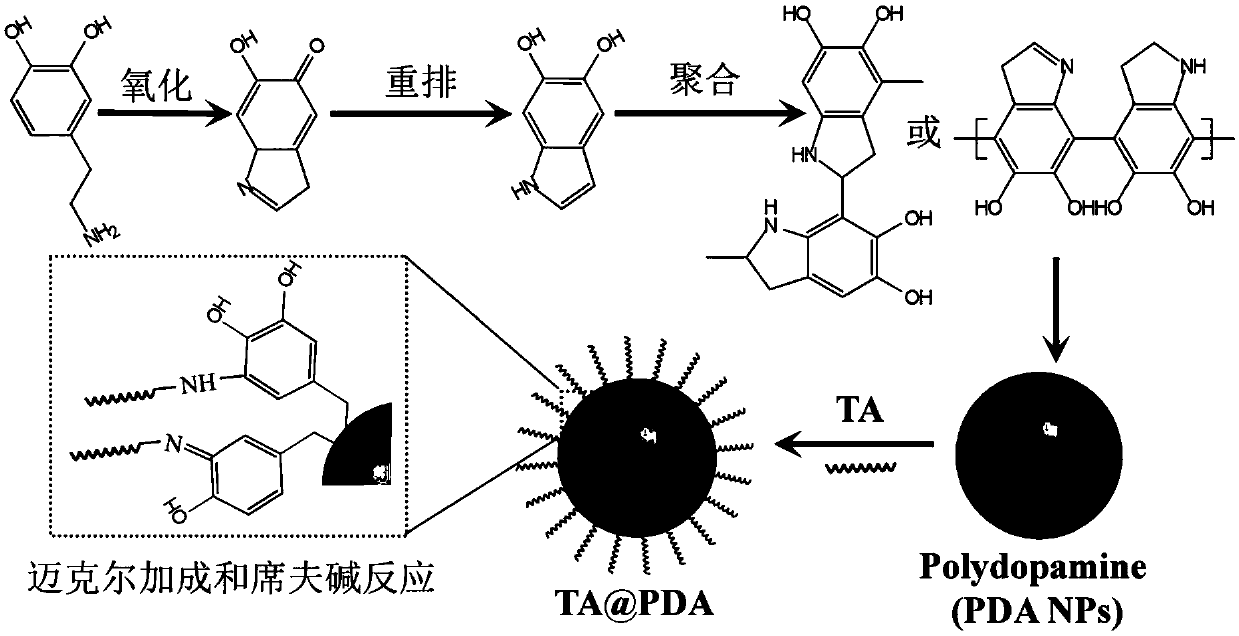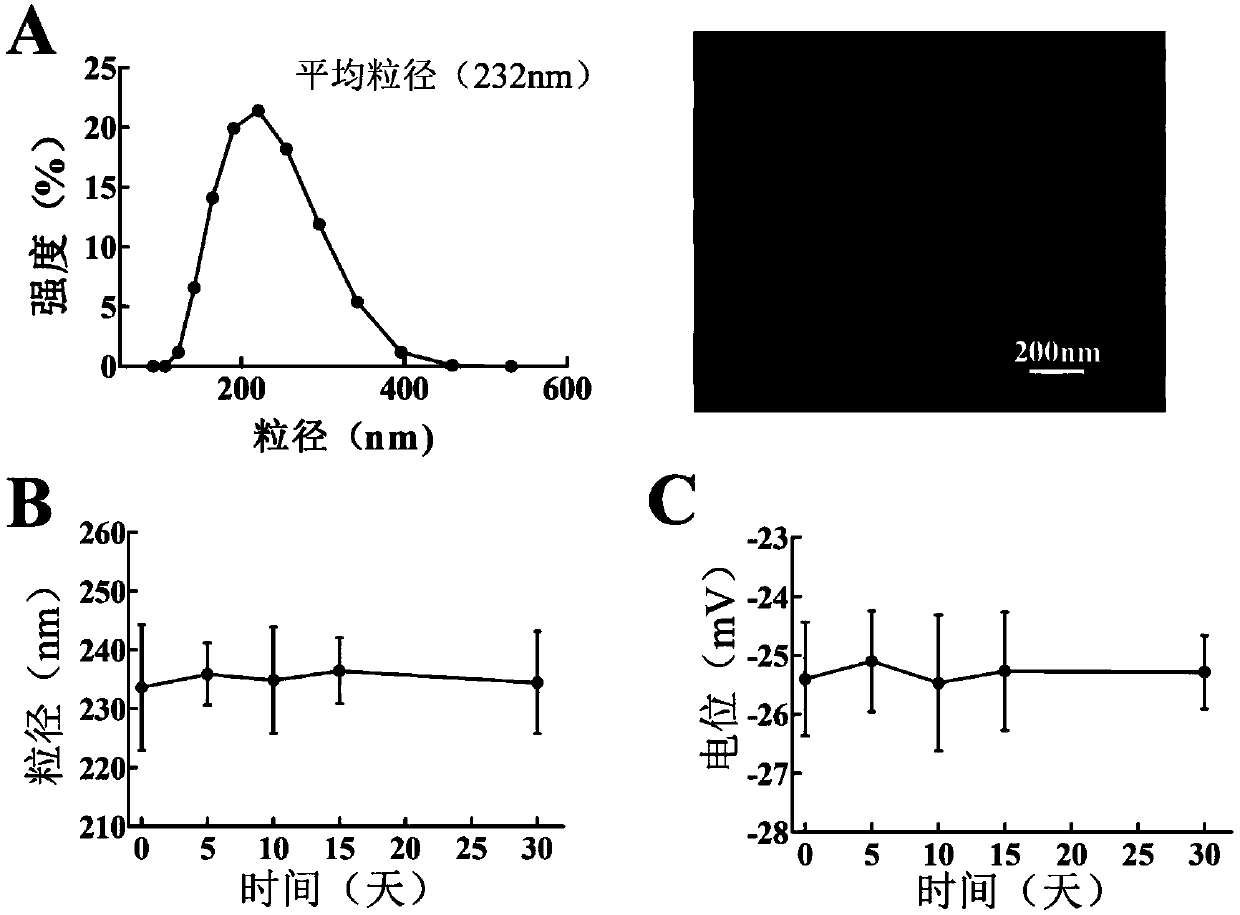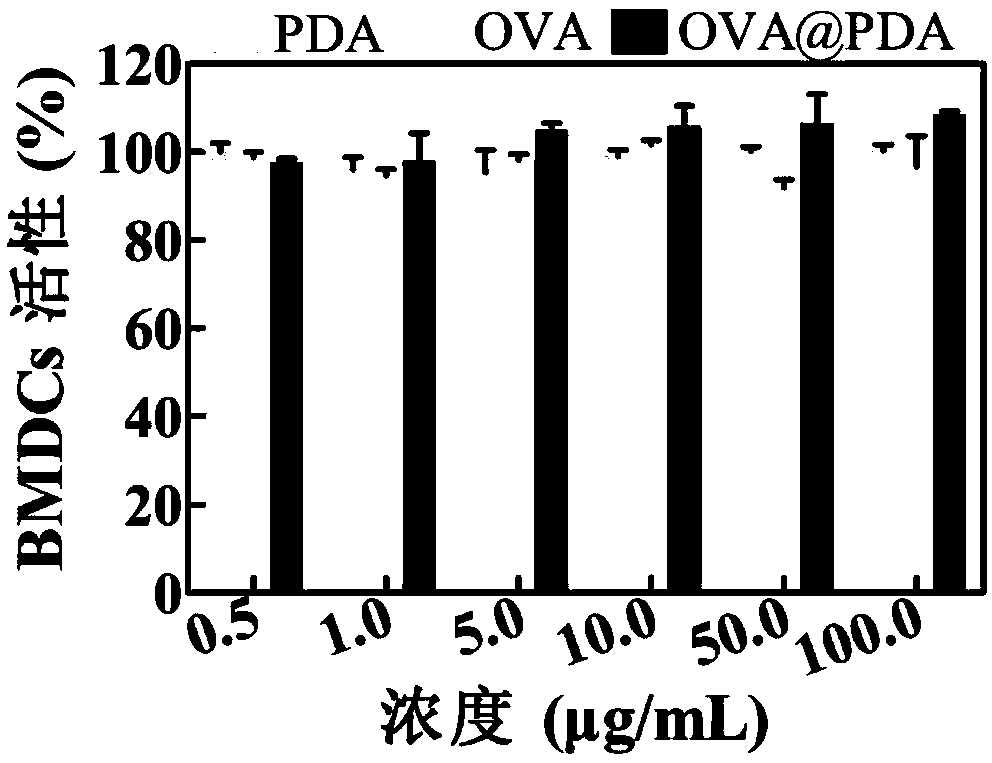Tumor antigen loaded polydopamine nanoparticles, and preparation method and application thereof
A technology of tumor antigen and polydopamine, which is applied in antitumor drugs, cancer antigen components, vertebrate antigen components, etc., can solve the problems of high cytotoxicity and cell membrane damage, achieve good biocompatibility, and the preparation method is mild and simple , the effect of inhibiting growth
- Summary
- Abstract
- Description
- Claims
- Application Information
AI Technical Summary
Problems solved by technology
Method used
Image
Examples
preparation example Construction
[0039] The preparation method of polydopamine nanoparticles loaded with tumor antigens comprises steps:
[0040] Dissolve dopamine hydrochloride in deionized water to obtain a dopamine hydrochloride solution; add sodium hydroxide aqueous solution to the dopamine hydrochloride solution under stirring at 37-70°C to obtain the first mixed reaction system, the first mixed reaction The mass fraction of sodium hydroxide in the system is 0.0001% to 0.1%, followed by oxidation, rearrangement, and polymerization for 1 to 6 hours; the concentration of dopamine hydrochloride solution is 1 to 60 mg·mL -1 ;
[0041] Centrifuge the reaction product at 5,000 to 15,000 g for 3 to 25 minutes, and then wash to collect polydopamine nanoparticles; resuspend the polydopamine nanoparticles in deionized water to obtain a polydopamine nanoparticle solution;
[0042] The polydopamine nanoparticle solution is mixed with the tumor antigen solution, and reacted for 1 to 24 hours at 0 to 37° C.; wherein,...
Embodiment 1
[0047] Example 1: Preparation and application of polydopamine (OVA@PDA) nanoparticles loaded with tumor model antigen OVA
[0048] 1. Synthesis of OVA@PDA nanoparticles
[0049] 30 mg of dopamine hydrochloride was dissolved in 10 mL of deionized (DI) water, and an aqueous sodium hydroxide solution was added under stirring conditions at 45° C. to obtain the first mixed reaction system. The mass fraction of sodium hydroxide in the first mixed reaction system was 0.1%. , then reacted for 3 hours; the product obtained by the reaction was centrifuged at 7000×g for 10 minutes to collect polydopamine nanoparticles (PDA nanoparticles), and washed with deionized water to remove residual dopamine, and then the PDA nanoparticles were resuspended in 3 mL to remove In deionized water, a PDA nanoparticle solution was obtained.
[0050] 5mg OVA is dissolved in 5mL deionized water, then add 0.5mL PDA nanoparticle solution and formaldehyde aqueous solution under stirring condition at 30 ℃, ob...
Embodiment 2
[0070] Example 2: Preparation and application of polydopamine nanoparticles loaded with tumor cell lysates
[0071] 1. Preparation of tumor cell lysate (TCL)
[0072] Add complete medium (RPMI1640 containing 10% FBS and 1% antibiotics) to MC-38 cells in 5% CO 2 Incubate at 37°C in an incubator. When the cells reached 80%-90% confluence, the cells were routinely digested to prepare a cell density of 1×10 7 mL -1 cell suspension. 2 mL of the cell suspension was subjected to five freeze-thaw cycles for lysis, followed by centrifugation of the lysate to remove cell debris (1500 g, 10 min). The concentration of TCL solution was measured by BCA method, and the obtained TCL was diluted to a suitable concentration for in vivo and in vitro experiments.
[0073] 2. Synthesis of PDA nanoparticles and TCL@PDA nanoparticles
[0074] 20 mg of dopamine hydrochloride was dissolved in 10 mL of deionized water, and then an aqueous solution of sodium hydroxide was added under vigorous stir...
PUM
| Property | Measurement | Unit |
|---|---|---|
| quality score | aaaaa | aaaaa |
| quality score | aaaaa | aaaaa |
| quality score | aaaaa | aaaaa |
Abstract
Description
Claims
Application Information
 Login to View More
Login to View More - R&D
- Intellectual Property
- Life Sciences
- Materials
- Tech Scout
- Unparalleled Data Quality
- Higher Quality Content
- 60% Fewer Hallucinations
Browse by: Latest US Patents, China's latest patents, Technical Efficacy Thesaurus, Application Domain, Technology Topic, Popular Technical Reports.
© 2025 PatSnap. All rights reserved.Legal|Privacy policy|Modern Slavery Act Transparency Statement|Sitemap|About US| Contact US: help@patsnap.com



